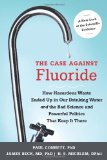In a Nutshell:
Fluoride is needed to help reduce dental caries.
In-depth:
Fluoride is mostly found in teeth and bones. The human body has about 2 to 6 g of fluoride.
Fluoride is an essential trace element. It contributes to the strength of the bones and teeth and it helps makes the teeth resistant. It has also been claimed that fluoride can help prevent the development of osteoporosis.
Fluoride is an important trace element which is responsible for the hardening of bones and teeth. Fluoride helps to make the teeth resistant to caries.
Requirement, deficiency, oversupply:
Recommended intake according to the DGE* |
Age |
Male |
Female |
19 - 25 |
3.8 mg |
3.1 mg |
25 - 51 |
3.8 mg |
3.1 mg |
51 - 65 |
3.8 mg |
3.1 mg |
over 65 |
3.8 mg |
3.1 mg |
*Deutsche Gesellschaft für Ernährung - a German Nutrition Society.
If you have a well-balanced diet, there is no risk in getting a fluoride deficiency.
A fluoride deficiency in children can lead to rotten teeth.
Too much fluoride can cause dental fluorosis (whitish to brown-coloured stains on the enamel of the remaining teeth).
top  |
Fluoride in Foods:
Fluoride rich foods include black tea and fish, eggs, meat, wheat products and tap water.
top 

The Case Against Fluoride: How Hazardous Waste Ended Up in Our Drinking Water and the Bad Science and Powerful Politics That Keep It There,
Paul Connett, James Beck, H. Spedding Micklem

The Fluoride Deception
Christopher Bryson
|

